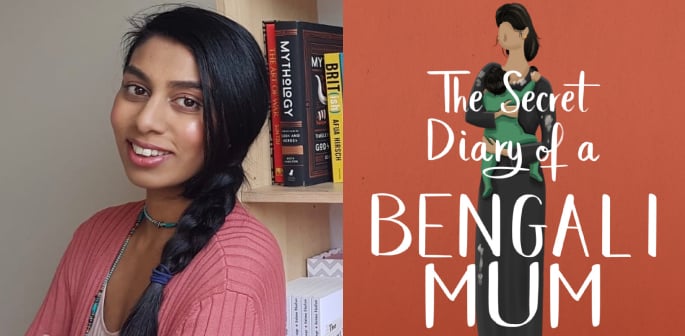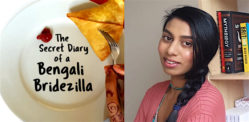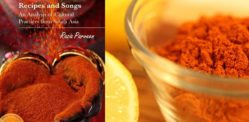"In reality, nobody truly has it all."
In her latest book, The Secret Diary of a Bengali Mum, Halima Khatun delves into the complexities of motherhood with a candid, humorous lens.
Known for her honest portrayal of British Bengali women’s experiences, Khatun shifts the focus in this instalment from romantic relationships to the emotional and physical toll of postpartum anxiety and the loss of self.
Drawing on her own experiences as a mother, she presents the unspoken realities many women face, particularly those of colour, while juggling cultural expectations and the pressures of modern motherhood.
Through relatable characters and witty storytelling, Halima Khatun invites readers to reflect on the multifaceted journey of new mothers, offering both laughter and empathy.
This interview explores her motivations, the cultural nuances in her writing, and the importance of humour in navigating these heavy topics.
What inspired you to explore postpartum anxiety and identity struggles of new mothers in the British-Bengali context with humour and honesty in The Secret Diary of a Bengali Mum?
 The motivation behind The Secret Diary of a Bengali Mum was to share a story that portrayed a less-discussed reality.
The motivation behind The Secret Diary of a Bengali Mum was to share a story that portrayed a less-discussed reality.
There is, rightly so, a big focus on postnatal depression. However, anxiety is common amongst many new mums and isn’t explored as much.
Also, despite having older sisters and many women around me, nothing prepared me for motherhood.
I’d read parenting books and attended NCT (National Childbirth Trust) classes.
Yet, I hadn’t anticipated the real loss of identity and the mourning of one’s former self that happens after you become a mum.
It’s hard to truly grasp unless you go through it, and I wanted this book to display the visceral feelings of identity, loss and loneliness, despite, ironically, never actually being alone, as you are with a newborn 24/7.
I also felt it was important to share an unfiltered story, particularly in light of the social media world, in which we live now, where the best parts of motherhood are often depicted.
Since your last interview with DESIblitz in 2021, how has your writing process evolved?
A lot of the fundamentals are the same as my writing process.
I still have an editor, beta readers, advanced readers, and an entire tribe dedicated to making my book the best it can be.
However, since my last interview, I have hired a new cover designer after winning a scholarship.
It gave me a huge boost and sense of validation, particularly as I was a mother of two very small children and was working around them (and still am!).
I guess another change that has happened over time is that I am deeper into the series, therefore have more rounded characters as we can dive into their backstories in more detail.
What key message do you hope readers take away about balancing the roles of career-driven woman, wife, and mother, especially for women of colour, in challenging the idea of “having it all”?
 I feel that the most important thing for any new mother is to know that it’s okay not to have it all and do it all.
I feel that the most important thing for any new mother is to know that it’s okay not to have it all and do it all.
Society tends to applaud working women, yet there doesn’t seem to be as much praise for those who choose to be stay-at-home mums.
If I’m honest, those notions were ingrained in me, pre-motherhood.
The notion of having it all is something we are built to aspire to. However, in reality, nobody truly has it all.
Usually, there is a payoff, and the mums I know that did go back to full-time work straight away always tell me about how much of a juggle it is.
As a woman of colour, I thought I had to prove that despite being a second-generation immigrant and having an unequal footing compared to my white peers, I could do it all.
However, it was only after having my daughter that I realised I didn’t want to put her in childcare when she was a baby, so I took a step back from my corporate PR career.
That turned out quite well, as I now get to focus on writing this series!
How does the shift to motherhood affect the dynamic between your characters, particularly regarding marital expectations and cultural norms, compared to the focus on love and relationships in your previous books?
There is a huge shift! Romance goes out of the window and makes way for sleepless nights and gender imbalance.
In all cultures, women bear the brunt of childcare.
The pandemic proved this when everyone started working from home.
My character goes from being a career woman working in central London to being tethered to a newborn 24/7 while her husband carries on with work as usual.
She struggles with this new normal.
I think that’s something many couples can relate to, no matter how equal we feel we are pre-kids.
Do your journalism skills help you craft authentic narratives on complex topics like race and identity? How do you balance humour with these heavier themes?
 My journalistic background certainly came in handy, as that involved learning people’s backstories and understanding their motivations and aspirations.
My journalistic background certainly came in handy, as that involved learning people’s backstories and understanding their motivations and aspirations.
It was so natural for me to include heavy themes like race and identity because they are so prevalent in society, despite how much we like to believe that isn’t the case.
Recent events such as the race riots proved that many people won’t like you based on your skin colour alone. As a person of colour, I have been acutely aware of this my whole life.
However, my books are fundamentally comedic, and I didn’t want to write something worthy or preachy.
My stories are more nuanced. First and foremost, I wanted people to enjoy the stories.
There has been great feedback from non-Asian readers, who have seen things from the lens of the protagonist that they didn’t understand before.
That said, it is important to deal with heavy themes with sensitivity. The first book in the series, The Secret Diary of an Arranged Marriage, was heavy on the humour.
However, as the series progresses, particularly in the latest book, The Secret Diary of a Bengali Mum, where the protagonist is dealing with issues such as postnatal anxiety, the humour is provided by the side characters, such as the adorable yet overbearing mum.
There’s a lot of humour in your novel, despite the weighty subject matter. How important is humour to you in dealing with personal and cultural challenges?
I do think that humour is a tool that brings people together and I don’t know a single person that doesn’t enjoy comedy!
And as a British-Asian, I find myself, laughing at situations that can be uncomfortable.
For example, colourism is very much alive and well in our communities, and I have used this to satirical effect in the books.
It’s not to make light of the issue, but I show what it’s really like as a brown girl growing up in a society where fairness is considered beautiful.
Also, I do feel that humour is a powerful tool to engage in serious topics that people might otherwise shy away from because they’re uncomfortable.
What advice would you give aspiring writers, especially women from minority backgrounds, who want to share their stories?
 One of the best pieces of advice my editor gave to me, was to not hold back when I’m writing.
One of the best pieces of advice my editor gave to me, was to not hold back when I’m writing.
If you worry about what people will think – your mum, siblings, friends – this will be reflected in the words.
Just like the saying, ‘dance like nobody is watching’, you should write like nobody is reading!
This will help you create a true, authentic draft.
The other advice I would give to women from minority backgrounds is to go ahead and write that story!
There aren’t enough of our voices out there and we need to hear them.
Can you share any upcoming projects or new directions you’re considering after The Secret Diary of a Bengali Mum? Will we see more of this character’s journey?
I am currently working on a side story to the series, entitled Sister of the Bride.
This focuses on the protagonist’s big sister, who had an arranged marriage back home in Bangladesh.
It’s a completely different tone of voice and direction, but still deals with the heavy themes and has a lot of the humour of the main series.
I can’t wait to share it with readers.
Lastly, how have readers, particularly South Asian women, responded to your portrayal of motherhood and the expectations placed on women in the community?
 The response from South Asian women has been amazing. Many have said they felt seen and it has resonated with them in a way no other books have.
The response from South Asian women has been amazing. Many have said they felt seen and it has resonated with them in a way no other books have.
I think it’s because there aren’t enough unfiltered voices from the South Asian community coming out in literature, so this was a refreshing change.
Also, while other books focus on a feisty South Asian girl who lives in an area around her community, my protagonist has always been a minority in a small white town.
Her view of the world is different and her sense of identity is more fragile. I think that’s what many people relate to.
Another reader pointed out that my book, The Secret Diary of a Pregnant Bengali, gave the most realistic version of childbirth she had ever read. I don’t pull any punches!
As Halima Khatun continues to write stories that resonate with readers, particularly South Asian women, her candid exploration of motherhood and identity offers a refreshing and necessary perspective.
Her blend of humour and honesty allows readers to find joy and comfort in the shared struggles of balancing career, family, and cultural norms.
With upcoming projects that explore new facets of these themes, Halima Khatun remains committed to amplifying voices and stories that are often underrepresented in literature.
For aspiring writers, particularly women of colour, her advice is simple but powerful: write boldly, without fear of judgment.
Halima Khatun’s journey is an inspiring testament to the importance of authentic storytelling, and her work continues to open doors for others to follow.
To learn more about Halima Khatun and explore her work, click here.






























































